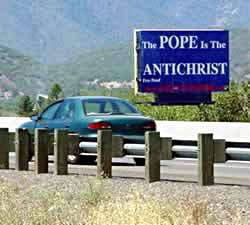Remembering Scalia's Sense of Humor - And When the Court Was WASPy To the Max
Abortion, not religion per se, is the thing people care about most when it comes to the religious views of justices.
Orange County Register columnist Ron Hart recalls a side of Justice Antonin Scalia that is often overlooked: The guy had a sense of humor.
I was fortunate to meet Scalia on a few occasions. Once I brought a parking ticket and asked if he could look into for me. He said he would have, but he had jury duty that day. No one laughed harder and took himself less seriously. Scalia was likable, authentic, approachable, brilliant and intellectually honest.
Hart also notes two other things regarding Scalia.
First:
Scalia, the justice most hated by the Left, was nominated by President Ronald Reagan and confirmed 98-0 by the Senate in 1986. Can you imagine that today?
And second, the Court is no longer WASPy to the extreme:
When Justice John Paul Stevens left the court at age 89 (he was so old they had to keep reminding him to close his robe), we no longer had a Protestant on the Supreme Court. As a minority, we WASPs will soon be getting into Harvard with 950 SAT scores and qualifying for casino licenses.
The remaining justices are all either Catholic or Jewish, which is not simply a sea change from generations past but a real stumbling block for folks that believe the Court should reflect the theological diversity of the country. About 50 percent of the country is some form of Protestant Christianity, 20 percent Roman Catholic, and 6 percent everything else. Atheists pull about 3 percent and agnostics another 4 percent (totals don't add up to 100 due to non-responses, says Pew Research).
Even as late as the 1970s, the idea of evangelical protestants and Catholics getting along was a stretch, with fundamentalists opposing figures such as Billy Graham and Jerry Fawell for promiscuous ecumenicism. Many evangelical protestants even held their tongues when Roe v. Wade was issued in 1973. Being anti-abortion was such a bedrock principle of Catholicism, after all, how wrong could it be if you believed protestant theology? As Randall Balmer has written in a must-read story about the "real origins of the Religious Right":
Although a few evangelical voices, including Christianity Today magazine, mildly criticized the ruling, the overwhelming response was silence, even approval. Baptists, in particular, applauded the decision as an appropriate articulation of the division between church and state, between personal morality and state regulation of individual behavior. "Religious liberty, human equality and justice are advanced by the Supreme Court abortion decision," wrote W. Barry Garrett of Baptist Press.

In fact, says Balmer,
It wasn't until 1979—a full six years after Roe—that evangelical leaders, at the behest of conservative activist Paul Weyrich, seized on abortion not for moral reasons, but as a rallying-cry to deny President Jimmy Carter a second term.
It's also worth noting that in the immediate passage of Roe v. Wade, abortion was also not clearly a liberal/conservative or Democratic/Republican issue. High-profile Republicans such as Barry Goldwater, Nelson Rockefeller, and Bob Packwood were for it. In 1967, Ronald Reagan legalized "therapeutic abortion" in California, saying it "was a subject I'd never given much thought to." The increase in abortions in California disturbed him and he eventually became firmly anti-abortion, though as Balmer writes, Reagan didn't always foreground that position, even when talking to evangelicals. Raised a Baptist, Jimmy Carter has always been personally opposed to abortion and has even called for the Democratic Party to become more "pro-life." As governor of Georgia and later as president, he says he tried to minimize its incidence while respecting the legality of the procedure post-Roe. Balmer argues that one of the reasons Carter fell out of favor with evangelicals was "his refusal to seek a constitutional amendment outlawing it. That failure "was viewed by politically conservative evangelicals as an unpardonable sin."
Over the past 30 or 40 years, the biggest shift in terms of religion in American life is that the new divide is not among followers of different faiths; it's between religious people and non-religious or secular types. In an American political context—and certainly when it comes to the Supreme Court—that issue reduces down almost completely to abortion and, with the passage of Obamacare's various mandates, arguments over mandates for birth control coverage (should Catholic orders be forced to offer this against their faith?) and types of birth control (Hobby Lobby objected not to birth control per se but to types its owners considered abortifacients).
Since the Religious Right is now firmly anti-abortion, questions about the specific religious beliefs of justices are secondary at best. Both the right and the left, Republicans and Democrats, know the real question is less about whether the Pope is the vicar of Christ on Earth or a covenant of grace not works. It's whether abortion is legally permissible.
Related: "What's The Libertarian Position on Abortion?" Great discussion featuring Reason's Ron Bailey, Katherine Mangu-Ward, and me, plus The Federalist's Mollie Hemingway. Watch below, more details here.


Show Comments (35)